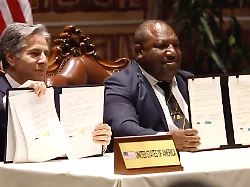Agreement with Papua New Guinea
US increases pressure on China with Pacific Pact
05/22/2023 12:06 p.m
The US conflict with China is global. In the Pacific region, Washington is now attempting to contain its rivals with the help of a defense agreement. US ships should therefore be able to call at ports in Papua New Guinea in the future.
In the struggle with China for influence in the strategically important Pacific region, the US has signed a new security pact with Papua New Guinea. US Secretary of State Antony Blinken and Papua New Guinea’s Prime Minister James Marape signed the document in the capital, Port Moresby, as the US broadcaster CNN reported. The US State Department said the agreement will help strengthen security and stability in the region.
Washington is intensively courting the countries in the Indo-Pacific region in order to counter China’s drive for power in the region. Papua New Guinea’s position north of Australia makes the island state very interesting strategically: as early as World War II, the island, which was largely covered by dense jungle, was the scene of bitter fighting between the Japanese, Americans and Australians. With almost ten million inhabitants, it is also the most populous of the Pacific island states.
The agreement is about defense cooperation and maritime surveillance. According to reports, US forces will also be granted access to the Pacific country’s ports and airports. This is controversial in Papua New Guinea. Students across the country protested against the agreement on Monday. However, Marape said his country had maintained military relations with the United States since 1989. According to the US State Department, the exact text of the pact will only be published after it has come into force.
“Border Disputes Inevitable”
Papua New Guinea’s government previously said the country had no enemies. “But it pays to be prepared.” The deal is not about geopolitics, but about Papua New Guinea’s need to build up its defense capabilities “as border disputes are inevitable in the future.” However, the pact will not prevent the country from working with other countries, including China.
Blinken came on behalf of US President Joe Biden, who canceled his planned visit last week. Because of the budget dispute in the US, he wanted to return to Washington immediately after the G7 summit in Hiroshima, Japan. The cancellation caused disappointment in Papua New Guinea. It would have been the first visit by a sitting US President. However, Biden has invited Marape and top politicians from other Pacific states to a meeting in Washington later this year. Chinese President Xi Jinping has already visited the Pacific States three times, including Papua New Guinea in 2018. Beijing is also trying to expand its influence in the region. Last year, the country signed a security agreement with the Solomon Islands.
In addition to the bilateral talks, Blinken also met with heads of state and government from 14 Pacific countries, including New Zealand Prime Minister Chris Hipkins. In addition, Indian Prime Minister Narendra Modi traveled from Hiroshima to the Pacific island.
